Tidbits - Nov. 18, 2021 - Lots of Reader Comments: Kenosha Killer; White Supremacists Attack on Democracy; Bomb Didn’t Beat Japan, Red Army Did; The Harder They Fall; New resource on Black films; Howard Zinn; Announcements; more ....

Re: Countries Strike Deal at COP26 Climate Summit (Michael Henry Starks)
Re: Report Outlining How to Cut $1 Trillion From Defense Budget Is Just a Start (Arlene Halfon)
Kenosha killer Kyle Rittenhouse pleads self defense -- cartoon by Lalo Alcaraz
Re: Here Are the 6 House Democrats That Voted No (Joseph Maizlish)
Steve Bannon - The Con -- cartoon by Steve Sack
Re: Last Week’s Elections Actually Gave Leftists Plenty to Cheer (Sharon Beals; Timothy Page; Ned McGuire)
Re: White Supremacists Declare War on Democracy and Walk Away Unscathed (Matt Owen; David Heatherly; Bryant Hardison; Burt Cohen)
Re: How Textbooks Taught White Supremacy (Joe Grogan; Edan Noelle; Becky Atess Faith Amose; Jason Blanchard; Karen Freeman; Van Caldwell)
Re: How the FBI and Kenosha Police Received Wisconsin’s BLM Protester List (Judith Halprin)
Energy Dinosaur -- cartoon by Rob Rogers
Re: Moments of Rupture: The 1930s and the Great Depression (The CUNY School of Labor and Urban Studies; Michael Funke; Mark Solomon)
Re: Ted Cruz Condemns Big Bird For Advocating Covid Vaccines For Kids (Craig Gauthier)
Re: Highly Paid Union Workers Give UPS a Surprise Win in Delivery Wars (Henry Fulkerson; Art Lindsay; Elrick Somar)
Re: ‘A slap In the Face’: Nurses’ Strike Signals Kaiser’s End As Union Haven (Norm Littlejohn)
Re: Medicare Advantage Plans Costing Billions More Than They Should (Gavrielle Gemma)
Re: The Bomb Didn’t Beat Japan … Stalin Did (Jason D Capell; Lawrence Rockwood; John Aldis; Joseph Kaye; Dan Morgan; Timothy John Tiedemann; Jack Radey; Owen Williamson; John Marienthal; Ron Ingle)
Re: Israel Moves to Silence the Stalwarts of Palestinian Civil Society (Stan Nadel)
Re: ‘The Harder They Fall’: A Big, Star-Studded Black Western (Olori Bae Omowale; Robert Skidmore)
Resources:
A New Archive Shows Where to Stream Hundreds of Classic Black Films (Hyperallergic)
Announcements:
Howard Zinn's People's History of the United States on Stage, Screen, and in Classroom - December 7 (NYU's Social Studies Program, Educational Theatre Program, Tamiment Library, Brooklyn College's Social Studies Program)
TWENTY YEARS OF WAR - Coalitions of War and Anti-War - December 7 (Cornell University)
Strategically Passing Ballot Measures – Even in Red States! - December 14 (Action Together Network)
Today in History - The Black Spartacus - November 18, 1803 - Last Battle of the Haitian Revolution (RosaLuxHistory)
Re: Countries Strike Deal at COP26 Climate Summit
Reading about COP26 has brought me to tears more often than anything else in my life.
Michael Henry Starks
Posted on Portside's Facebook page
Re: Report Outlining How to Cut $1 Trillion From Defense Budget Is Just a Start
Cutting the (War) Budget
When will we stop using the word, "defense" when talking about weapons, wars and military. At a minimum we should say, "euphemistically called 'defense.'" "Defense" could be used if talking about true 'homeland security' which would include subjects such as climate change, gun control, universal health care, education. housing, food, transportation, etc. If we talk about killing, maybe call it "offense" or just plain "killing."
Arlene Halfon
Colony of Colombia
Kenosha killer Kyle Rittenhouse pleads self defense -- cartoon by Lalo Alcaraz
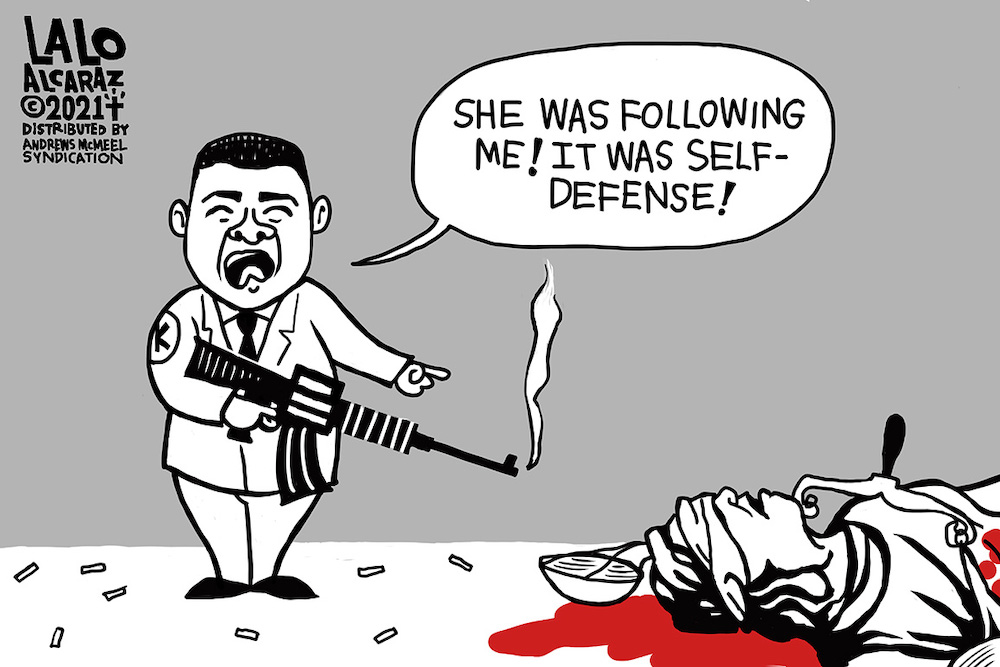
Lalo Alcaraz
November 17, 2021
pocho.com
Re: Here Are the 6 House Democrats That Voted No
An alternative would have been to support the physical-emphasis infrastructure bill system way back in August, and then spend their energy since then talking about the human service needs and the damage being done by the political culture's fixation on money budget deficits while ignoring the "quality of life" budget deficits. They were, and are, the people who can best do that -- recall Bush's camp-in outside the Capitol.
Can't blame them, though, in frustration about the damage and pain being caused daily, for choosing to try to use whatever slim leverage they had (or thought they had) to compel the majority that doesn't share their views to support their programs.
Joseph Maizlish
Steve Bannon - The Con -- cartoon by Steve Sack

Steve Sack
August 22, 2020
Minneapolis Star Tribune
Re: Last Week’s Elections Actually Gave Leftists Plenty to Cheer
Is this inspired by Rebecca Solnit's piece in the Guardian? Heartening.
Sharon Beals
Posted on Portside's Facebook page
=====
News media loves to stir up drama.
Even the "liberal" media.
Timothy Page
Posted on Portside's Facebook page
=====
Good news after all!
Ned McGuire
Posted on Portside's Facebook page
Re: White Supremacists Declare War on Democracy and Walk Away Unscathed
The US was built on white supremacy, first slavery and genocide, then on perpetuating the injustices they produced. Now it is a place where the overwhelming majority is forced to sell power over their work for paychecks...
"American democracy" is but a reshaping of "Athenian democracy:" the fascists are but removing the veil, giving those fighting for genuine democracy a clear target to smash... ??
Matt Owen
Posted on Portside's Facebook page
=====
well, yes... it's a bit more complex than Athens, because in Athens 99% of the population were slaves. You would think that would be unsustainable, but it was a totally different model than plantation slavery. There were so few citizens in Athens, that they didn't have senators or representatives, they just voted directly on major issues. So they had a direct democracy, but without universal suffrage.So what I discovered, from reading the Federalist and anti-Federalist papers, is that the "founders" had kind of a fetish for ancient Roman history. Especially Plutarch and Livy. And one of those historians, I think it was Livy or Tacitus, came up with this idea that every civilization in history follows the same political path, with 3 major moments. The first moment is democracy, the second moment is oligarchy, and the third moment is monarchy. Monarchy ultimately leads to revolution and a return to democracy, and the cycle starts up again.
So this is what some of the Romans believed, and it's very fatalistic because they didn't really believe that you could change the course of history as an individual. You're just a participant in the natural course of things. Of course, this wasn't based on any kind of science, just their observations of history based on their knowledge. And the "founders", they were steeped in this kind of stuff. The central concept of the American government is to try to create a state of continual stale-mate between what they identified as the only 3 possibilities for human government. What we call the "balance of powers" between the 3 branches of the Federal government.
David Heatherly
Posted on Portside's Facebook page
=====
Every person charged for attempting to destroy our Capitol, our Constitution and democracy should face the most severe of penalties and politicians even more severe if possible.
Bryant Hardison
Posted on Portside's Facebook page
=====
In the Philippine coup of 86, the perpetrators on the ground were punished, but not the powers behind them. So they did it again, better.
Burt Cohen
Posted on Portside's Facebook page
Re: How Textbooks Taught White Supremacy
hank you. We have similar problems here in Canada and I am sharing the article with others here. Increasingly here in Canada, we are increasing the effort to address racism in our public educational system, especially with respect to our Indigenous Peoples and other minority populations.
Joe Grogan
Caledon
=====
I attended a fancy college-prep high school in the late '80s, and I had a friend who was taking the AP US history class. One day, I started flipping through her textbook. I was looking for passages about chattel enslavement in the US, of course. Know what I found? Two whole paragraphs. Yep, 2! You know what the first sentence of that entire, 2-paragraph section said? "The lives of black people developed along much different lines than the lives of white people, and the black people weren't happy." Yes, it was so absurd that I memorized it. Not that memorizing that stupid sentence was hard. It's outlandishness made it quite memorable.
Edan Noelle
Posted on Portside's Facebook page
=====
Scientific racism was taught in schools in Scandinavia countries
Becky Atess Faith Amose
Posted on Portside's Facebook page
=====
Wow,
“White supremacy is a toxin. The older history textbooks were like syringes that injected the toxin of white supremacy into the mind of many generations of Americans.”
Jason Blanchard
Posted on Portside's Facebook page
=====
Starting with the assumption that the only people who were really people were white men.
Karen Freeman
Posted on Portside's Facebook page
=====
“Yacovone, who co-authored “The African Americans: Many Rivers to Cross” with Henry Louis Gates Jr. in 2013, is now writing “Teaching White Supremacy: The Textbook Battle Over Race in American History.”
Van Caldwell
Posted on Portside's Facebook page
Re: How the FBI and Kenosha Police Received Wisconsin’s BLM Protester List
critical race reality, looking to help a murderer get off. Defunding wasn't the worse thing said in 2020. Police officers acting as a dictator's gestapo and shock troops were far worse and in fact, need to be defunded, disarmed and indicted.
Judith Halprin
Posted on Portside's Facebook page
Energy Dinosaur -- cartoon by Rob Rogers
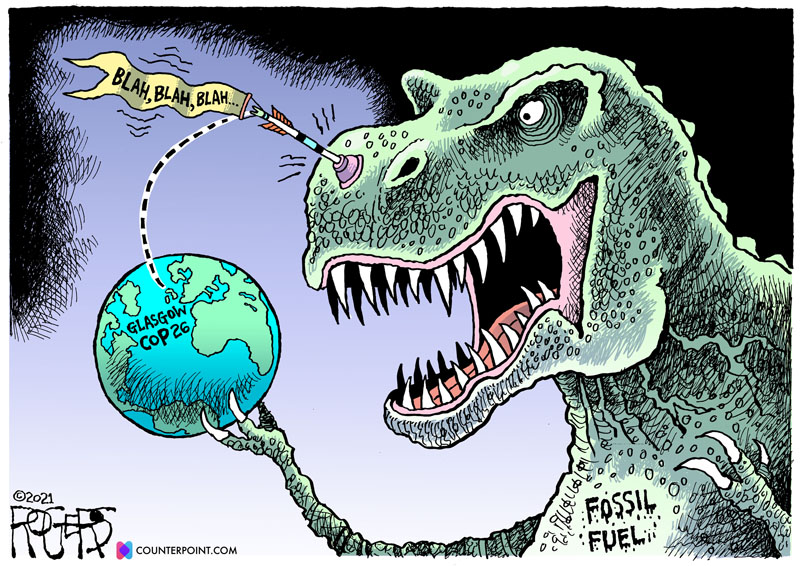
Rob Rogers
November 17, 2021
robrogers.com
Re: Moments of Rupture: The 1930s and the Great Depression
Occasionally, in politics and social-economic struggles, there occur "moments of rupture," periods of dizzying and dramatic change when hosts of opportunities present themselves and existing arrangements of power are radically altered. Via Portside https://portside.org/2021-11-15/moments-rupture-1930s-and-great-depress…
The CUNY School of Labor and Urban Studies
Posted on Portside's Facebook page
=====
Are you sure that photo of striking Steelworkers is "circa 1935-45"? Their signs read AFL-CIO. That merger took place in 1955.
Michael Funke
=====
Goldfield and Melchar do a good job of surveying the long and often bloody struggles of the US working class to defend its interests. Among those struggles were massive efforts to build and sustain labor unions – efforts that represent some of the most militant battles in all of labor history. Unfortunately, the article’s inspiration and insight are negated when falling into the old sectarian trough of anarchism and conjuring the timeworn artificial separation of economic battles from political engagement (and vice versa).
The writers gratuitously express “no objection” to labor’s legislative battles, but “we do not think that should be a major focus of resources.” That posture, voiced with varying degrees of insistence throughout, reflects the schematic and baseless separation of economic and political struggles. Battles for unions and for justice on the shop floor and battles against capitalist domination and control of political power are inseparable sides of the same historic coin. That truth is understood today, as in the past, as working class communities fight for economic survival and for building political beachheads to break the stranglehold of anti-labor legislation.
The article also misrepresents the historic record of labor advances in the thirties. It is true that a rising crescendo of “small strikes” in 1934, culminating in the mass San Francisco General Strike, pressured Roosevelt into endorsing the National Relations Act (Wagner Act) that largely removed impediments to collective bargaining. FDR doubtlessly wished to guide the content and direction of a labor upsurge to keep it in “safe” channels while rising unions were to aid in building working class purchasing power to cope with the Depression. Roosevelt did not aspire, to say the least, to abetting the growth of a powerful union movement. John L. Lewis, the crafty mine leader and head of the rising CIO did perceive a powerful jolt to labor organizing in the Wagner Act and famously proclaimed that “your president wants you to join a union.” While the Wagner Act grew out of the turmoil of 1934, a massive qualitative leap in union growth took place from 1935, spurred by legislative collective bargaining. It was after the Wagner Act became operational in 1935 that the unions of the CIO in auto, packinghouse, electric, steel, garment, etc. grew into powerful formations.
That historic experience confirms the inseparability of political engagement, including left populist factions in the Democratic Party, the American Labor Party, the Democratic Farmer-Labor Party, Labor’s Non-Partisan League, etc., combined with strikes, sit-ins, community-labor alliances that all contributed to new directions in the thirties. To surrender or downgrade either politics or economics in the struggle against inequality is tying one hand of the working class behind its back. That was true in the thirties and it is true today.
Mark Solomon
Re: Ted Cruz Condemns Big Bird For Advocating Covid Vaccines For Kids
(posting on Portside Culture)
It's an insult to any intelligent reasoning where these politicians are going with their anti anything, I'd like to know what's their solution to this deadly disease, but....
Craig Gauthier
Posted on Portside's Facebook page
Re: Highly Paid Union Workers Give UPS a Surprise Win in Delivery Wars
Once again, proof of a wage shortage, not a labor shortage.
Henry Fulkerson
Posted on Portside's Facebook page
=====
A surprising and fascinating look behind the business models of the two package delivery giants. Two very different business models. One old school the other fully optimized for the future. Guess which one is winning?
Art Lindsay
Posted on Portside's Facebook page
=====
Helsinki's dream industry has lately become more of a nightmare scenario at rival FedEx Corp. The massive labor shortage that’s rocked the U.S. since the pandemic and disrupted long-established employment relationships hasn’t had much impact on UPS, which pays its unionized drivers the highest wages in the industry. That’s helped it maintain a stable workforce and rising profits throughout the current disruptions. Meanwhile, lower-paying, nonunionized FedEx racked up $450 million in extra costs because of labor shortages. And while UPS easily beat earnings expectations and predicted a rising profit margin in the U.S. for the fourth quarter, FedEx signaled that its profit margin will fall further. The lack of workers is taking a toll on its reliability, too. FedEx’s recent on-time performance for express and ground packages has sunk to 85%, while UPS has met deadlines on 95% of those packages, according to data collected by ShipMatrix Inc
Elrick Somar
Posted on Portside's Facebook page
Re: ‘A slap In the Face’: Nurses’ Strike Signals Kaiser’s End As Union Haven
(posting on Portside Labor)
“Kaiser Permanente and the Alliance of Health Care Unions reached a tentative agreement on Saturday after more than 30,000 Kaiser Permanente employees threatened to strike on Monday due to a labor dispute. The deal is on a 4-year contract and covers nearly 50,000 Kaiser Permanente health care employees in 22 local unions, the company said, adding that a strike has been averted.
“The agreement includes wage increases, health and retirement benefits and bonus opportunities.”
Kaiser health care worker strike averted as tentative deal is reached, company says
CBS News
Norm Littlejohn
Posted on Portside's Facebook page
Re: Medicare Advantage Plans Costing Billions More Than They Should
I sent this to F. Schulte but would like it posted to portside. I know you don't take piece from ordinary non professionals but that is why you are always off point on many issues.
Insurance industry control of medical care is a result of both parties gift to the industry. In return all get campaign contributions (more accurately bribes). Every step of the way profits are the root of all the problems. Carving out one or the other example of the inherent corruption is fine, but makes it seem that if that is cleaned up, then care will be good. The whole system is graft, corrupt and most importantly parasitic and unneeded. Exposes are cited by the right wing to say there is fraud in the system, etc etc. They spin it always to make it seem we poor folks are cheating. That is the real world you are falling into.
You should know that this type of expose only results in the poorest losing the advantage plans that combine Medicare and Medicaid including eyes, dentist and prescriptions. It never results in just cleaning up the excess. It distracts from the major issue. Not your intention perhaps, though I have seen critics call for an end to all advantage programs and go back to "original Medicare." Obviously most who raise this have private insurance or can afford good supplemental programs.
The first issue, as a 72 year old post transplant patient with a yearly social security income of $10,356 or $863 a month. is the call for Medicare for All. If I only had Medicare without Medicaid, I would have nothing. Medicare is not free. I would have to pay $140 just for part B, plus more for prescriptions through a private insurance company for D. In addition it only pays $80%, with copays and deductibles. I could never access any care, let alone get a kidney transplant. While the term single payer was beyond stupid, it moved to Medicaid for all, then in a concession to the right, it became Medicare for all. I am in an advantage plan combining both and get dentist, eye, money for food and otc products. Does this make me a fan of the companies sucking money up. No. National healthcare for all would do the same without the profits.
Here in Louisiana we are one of the few southern states with the expansion which covers 1.9 million. In two years an extreme right winger may become governor and the fight is on now to keep the expansion. A full belly never understands an empty belly or knows how to fight the right wing of both capitalist parties.The republican and democratic party are committed to the profits of the war machine and this addiction can only be sustained by cutting social benefits.
The push has to be for national health care for all. Ban politicians getting money from insurance companies. How about an expose of how many democrats and republicans get money from the industry.
Your are hurting more than helping. A mere sentence that health care for profit results in the high costs and deprivation and it is in the dna of profit-making to find any even more corrupt means of making profit such as..... But the solution lies in taking the profit out with a national health care system funded by cutting the military death machine.
Gavrielle Gemma,
New Orleans
Re: The Bomb Didn’t Beat Japan … Stalin Did
I’ve known for quite some time that the dropping of nukes was unnecessary for Japan’s surrender and a senseless destruction of life but this article goes into far greater detail that I hadn’t been aware of.
Jason D Capell
Posted on Portside's Facebook page
=====
Stalin, may he be damned, should be given credit for winning the entire war. It is sickening xenophobic ignorance that there is no monument of thanks to the Red Army in Washington DC.
The sacrifice of those fighting a monster, while under a monster, should never be forgotten.
Lawrence Rockwood
Posted on Portside's Facebook page
=====
Wow, a long article. I guess it takes that to explain away the obvious.
John Aldis
Posted on Portside's Facebook page
=====
Excellent article ... except for the title, for which the author may not be responsible. Stalin didn't defeat Japan -- the Soviet armed forces did.
Joseph Kaye
=====
These details really build the case for that conclusion.
Dan Morgan
Posted on Portside's Facebook page
=====
Actually the bombs but the Russian invasion helped them realize they were cornered. The Japanese were more worried about an invasion of their homeland than the fate of the Kwantung Army which they were incapable of supplying after the US destroyed their navy.
Timothy John Tiedemann
Posted on Portside's Facebook page
=====
All absolutely on target, and a great analysis of the US bombing campaign and how the Japanese viewed it. There are a few more things to add.
1) The entire fire bombing campaign, concocted by Curtis LeMay and none other than Robert Strange MacNamara, was an attempt to make the B-29 bomber, built at great expense specifically for the long range bombing of Japan, had turned out to be a bust. It had been based on the idea of high altitude (the plane was pressurized), high accuracy bombing based on the Norton bomb sight. But when it was tried, they discovered the jet stream, which meant over Japan at high altitude they were getting 200 mph tailwinds, and the bomb sight couldn't handle this. So instead they switched to low altitude night bombing,, with incendiaries, where it makes no difference if you are on target or not. Once you get a city burning, the fire will do the damage. But the bombing campaign was not required. The US Navy (the submarines, with help from aviation) had sunk most of the Japanese merchant fleet, and the island was facing starvation. The Japanese navy had mostly been sunk, it was no threat. We could have stood off and waited for the islands to surrender or starve. Which also means the very costly invasions of Okinawa and Iwo Jima, taken to support the bombing campaign, were unnecessary.
2) The critical question in the negotiations was the status of God, also known as the Emperor Hirohito. The Japanese had thought deeply before going to war. They knew that if they could not persuade the US and its allies to come to terms in one year, the US industrial power would guarantee a Japanese defeat. After one year, and the Battle of Midway, the Japanese knew they were going to lose. But how to lose in such a way that what was essential was maintained. God. Hirohito ran Japan. The cabinet, generals, etc, made the public pronouncements. But the Emperor's word was final. Hirohito took the bust of Bismark off his desk, and replaced it with one of Abraham Lincoln. A group of princes were designated the "peace faction" and the police began assembling dossiers on them. It was planned to arrest some of them closer to the end, to make them credible partners for the US to negotiate with. The nation might starve, its cities burn, its fleet sink, but if the Emperor remained, what was essential in Japan remained. And Hirohito gave not one shit for the lives of the people killed. So, the US demanded unconditional surrender. The Japanese negotiators stood firm, you can't touch the Emperor. Guess who made the concession to get the surrender? Not Japan.
3) But if the war had gone on, and the Soviet Union crushed the Kwantung Army, and invaded the islands, there was going to be no way to keep them out of the Occupation Authority. And while the US was happy to swallow the lie that "Japanese Militarists" were in charge, the Soviet sense of humor was not quite as generous, they wanted Hirohito's head on a stick, and the abolition of the position of emperor. Uh oh. The US didn't want the Soviets to have even a toehold in Japan, or to disrupt our deal. In many ways, the Bomb was dropped, consciously by Truman and Jimmy Byrne, not so much to intimidate the Japanese as to intimidate Stalin.
4) The Bomb also not only highlighted US military strength, and technological superiority, but also was an outstanding ammunition for the US aviation industry, already bursting with wartime cash, and the fliers of the US Army Air Force (which had begun the war as the Army Air Corps and was eager to be an independent service) with ammunition for fighting the Army and Navy for its independence and a huge budget.
Jack Radey
Posted on Portside's Facebook page
=====
It was not the "Norton" bombsight, it was the "Norden" bombsight. My father helped develop it.
Owen Williamson
Posted on Portside's Facebook page
=====
There is a Japanese historian Tsuyoushi Hasegawa in 2005 who wrote Racing the Enemy: Stalin, Truman and the surrender of Japan. His idea is essentially the same. Stalin had pledged to declare war on Japan within 90 days of the end of war in Europe. The Russians did so by invading the northmost four tiny small islands of Japan AND simultaneously smashing the Japanese army in Manchuria. The Americans did not know if and how Stalin would keep his pledge. So they proceeded with their plans.
Hiroshima was targeted because it had been spared fire-bombing so the Army Air Force could assess the effectiveness of the bomb. WHAT is unforgivable is the decision to drop the second bomb 72 hours after the first. There was simply no time for the Japanese government to respond to the bombing- thru neutral diplomatic channels. Within the bomber mafia, -those officers and civilians in charge of the bombing including future Sec. of defense Robert McNamara- the mafia wanted to drop the second weapon because it was a different type of atomic bomb. Under the very real of the Russian army seizing a Japanese main island as revenge for its humiliation in the Russo-Japanese War of 1895, Japan surrendered.
John Marienthal
=====
In general, I do not agree with the author. Certainly, the soviet entry into the war was significant, but simply closed the door to a negotiated peace. there was a faction that still did not want to surrender at all but the emperor finally made the decision. The bombs had a huge effect on the emperor and that really pushed him over the edge.
Ron Ingle
Posted on Portside's Facebook page
Re: Israel Moves to Silence the Stalwarts of Palestinian Civil Society
If this were true the Israelis would not have limited their terrorist designations to NGOs with clear links to the PFLP--more than 70 people who were leaders of or salaried employees of these PFLP front NGOs were either high ranking PFLP officials or were engaged in terrorist activities. That was already on the public record before this action by the Israelis. The widespread defenses of these NGOs reminds me of the defenses of Stalin's USSR-- defending the Moscow trials and denying the Antisemitism in the post WWII purges. What Lenin is supposed to have called "useful idiots.
Stan Nadel
Re: ‘The Harder They Fall’: A Big, Star-Studded Black Western
(posting on Portside Culture)
I’m hella f*****g irritated with any and everybody who been hyping this damn show. It’s LITERALLY the same stereotypical bullshit they keep replaying such as how we kill each other and have no love for another. I’m not happy about the movie at all. Idc if it does come from some type of truth. I’m literally tired of seeing the same fucking shit played our people ......
Olori Bae Omowale
Posted on Portside's Facebook page
=====
Interview with the editor, Tom Eagles:
In “The Harder They Fall”, currently streaming on Netflix, Jonathan Majors and Idris Elba are opposing outlaws, leading their respective gangs into a classic Old West showdown through a series of expectation-defying twists. Film Editor Tom Eagles speaks with me about the journey from page to screen for this stylish western, the first feature-length film from Director Jeymes Samuel.
Below the Line
November 18, 2021
Robert Skidmore
Posted on Portside's Facebook page
A New Archive Shows Where to Stream Hundreds of Classic Black Films (Hyperallergic)
Hyperallergic speaks to Maya Cade, creator of the Black Film Archive, about showcasing an “abundance of Blackness across time.”
by Cydnii Wilde Harris
Novemmber 16, 2021
Hyperallergic
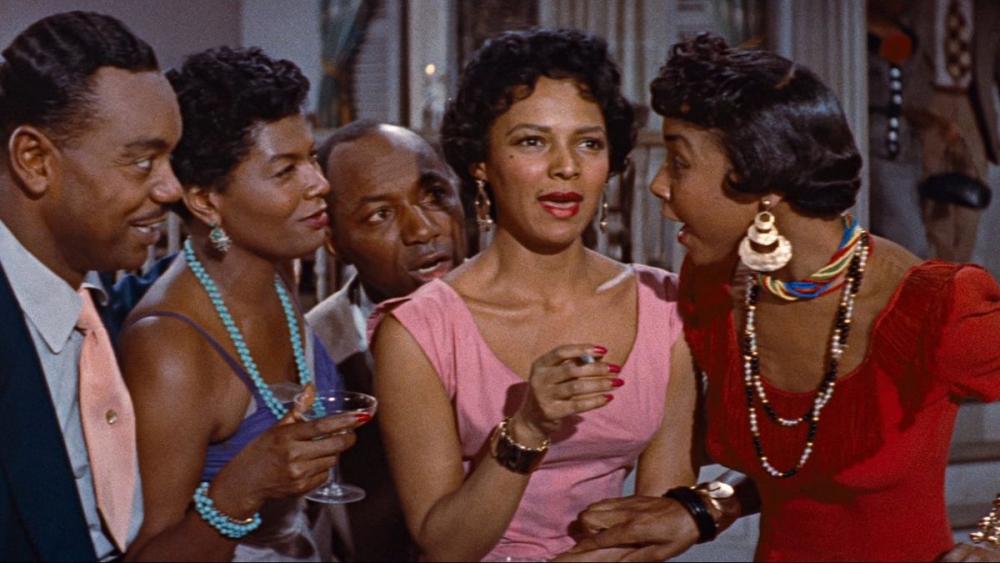
image courtesy Cinémathèque québécoise // Hyperallergic
Streaming platforms abound with homogeny. I used to scroll them seemingly endlessly, looking for icons with faces that looked like mine. The irony of erasure is that you can’t unsee your own invisibility. You’re relegated to “Black Voices” subheadings far down the page, only trotted out during the shortest month of the year. Then came the summer of 2020. Streaming sites have given us more prime real estate. As the saying goes, they Heard us, and now we See ourselves more.
Writer and digital strategist Maya Cade has taken things a step further. She long understood that Black films online lack not just visibility but also accessibility. “Everything I do is in service of Black people.” That’s one of the first things she shared with me about the Black Film Archive. An idea she’d been ruminating on for years, she was able to bring it to fruition this past August. It’s a database of classic Black films, with links to where they are available to stream. Currently it catalogues over 200 films, ranging from 1915 to 1979 and spanning multiple genres and countries of origin. But that description is too clinical; Cade wants the BFA to be a living platform that constantly evolves, though with its service of Black film and people always at the forefront. Cade and I spoke about the Archive over Zoom – a fitting venue in which to discuss an online resource.
Read full interview here
NYU's Social Studies Program, Educational Theatre Program, Tamiment Library, Brooklyn College's Social Studies Program Present:
Howard Zinn's People's History of the United States on Stage, Screen, and in Classroom
December 7 (5:00 PM ET)
Featuring
Anthony Arnove
Executive Producer of The People Speak, co-editor with Howard Zinn of Voices of A People's History
Staceyann Chin
poet and actor, performer in The People Speak
Brian Jones
Director, Center for Educators and Schools,
The New York Public Library, actor who performed in Zinn's Marx in Soho
Sonia Murrow & Robert Cohen
co-authors of Rethinking America's Past: Howard Zinn's A People's History of the United States in the Classroom and Beyond
RSVP using this form.
Tamiment Library & Robert F. Wagner Labor Archives/ NYU Special Collections
Elmer Holmes Bobst Library
70 Washington Square South, 2nd Floor
New York, NY 10012
TWENTY YEARS OF WAR - Coalitions of War and Anti-War - December 7 (Cornell University)
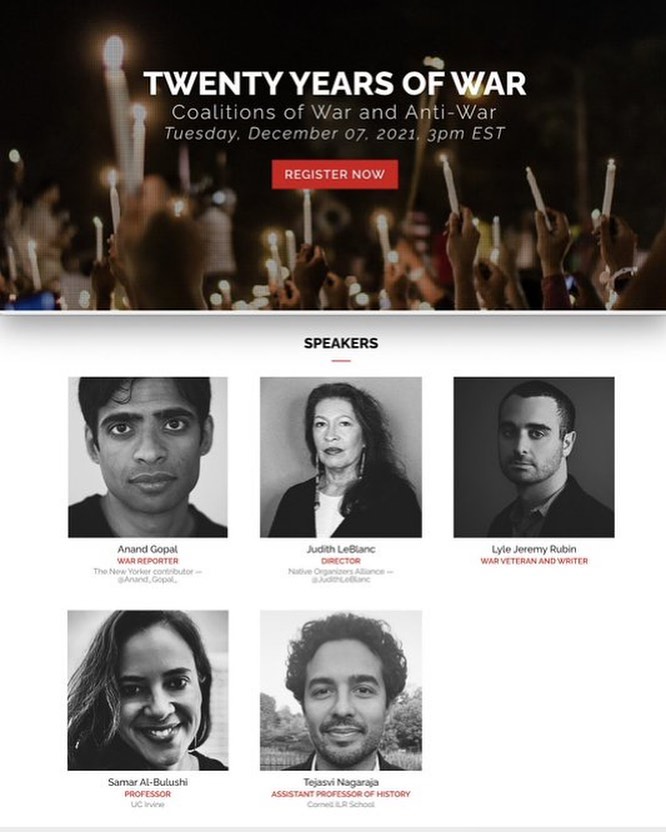
Tuesday, December 7, 2021, 3pm EST
In 2001, the Global War on Terror (GWOT) was inaugurated under U.S. leadership. Since then, U.S. Armed Forces have conducted significant operations in at least ten countries and been implicated in military operations and incarceration in dozens more. Several other countries have also waged their own GWOT security-state campaigns. But to what ends? This year, the 20th anniversary of the GWOT is an opportunity for timely, nuanced reflection.
In this webcast, a panel of leading scholars, journalists, and activists will take stock of the GWOT era and its widespread consequences. In the U.S. and elsewhere, “homeland security” has intersected with struggles over official Islamophobia, cross-border migration, Indigenous dispossession, and mass incarceration. Join us as Anand Gopal, Judith LeBlanc, Lyle Jeremy Rubin, Samar Al-Bulushi, and Tejasvi Nagaraja look back on the previous two decades and ahead to the future.
This is the second of two sessions offering expert reflection on the Global War on Terror, hosted by Tejasvi Nagaraja, Assistant Professor of History at Cornell University, and co-sponsored by Cornell’s Mario Einaudi Center for International Studies, American Studies Program, and the ILR School.
WHAT YOU'LL LEARN
- What “war” and “peace” mean for the livelihoods and labor among, for example, U.S. military recruits, Afghan farmers, and Kenyan working people.
- What “war” and “anti-war” mean to diverse sectors of people in Afghanistan, Iraq, Pakistan, Yemen, Somalia, Guantanamo Bay, Libya, Syria, Niger, and Iran.
- What “war” and “anti-war” mean to those people concerned with Indigenous sovereignty, Black Lives, migrant, and labor movements
Strategically Passing Ballot Measures – Even in Red States! - December 14 (Action Together Network)
Strategically Passing Ballot Measures – Even in Red States!
Webinar: Tuesday, Dec. 14, 5:00 p.m. PT/8:00 p.m. ET.
Register now: bit.ly/ATNdec2021
Passing statewide progressives policies in states dominated by conservative state legislatures may have once felt impossible. But with the rise of our communities strategically using ballot measures to pass everything from Medicaid expansion to minimum wage to marijuana legalization, times have changed! Our panel of progressive organizers will discuss best practices.
And even if your state doesn't allow citizen-initiated measures at the statewide level, it may allow them at the city and county levels, which can be perfect places to pass local policies in communities that set the path for statewide change -- and make immediate change for folks in your state!
Join us to learn from your organizing peers in Idaho, Kansas, Nebraska, and Texas about:
* How they have qualified and run successful ballot measures on progressive issues in red states.
* The lessons learned from signature gathering to implementation.
* Challenges to be aware of and plan for as you take this work on in your state.
* What is upcoming in these states in 2022, and please share with us what's coming up in your state!
* Moderator: Regina Clemente, Director, Western Rural and Plains States Project (WRAPS Project), Movement Voter Project
If you have specific topics you want addressed, please submit them to regina@movement.vote by Dec 6th. We look forward to dreaming and scheming with you!
Original link to this shareable post: https://bit.ly/3HaOkV3
WE STAND INDIVISIBLE, TAKE ACTION TOGETHER, AND RISE STRONGER. WE PERSIST, BUILD, AND RESIST BECAUSE THIS BATTLE IS FOR THE SOUL OF OUR COUNTRY AND EACH OTHER. WE ARE IN IT FOR THE LONG HAUL. WE ARE FIGHTING FOR OUR FUTURE.
FIND A GRASSROOTS GROUP NEAR YOU
CHOOSE YOUR STATE - click here
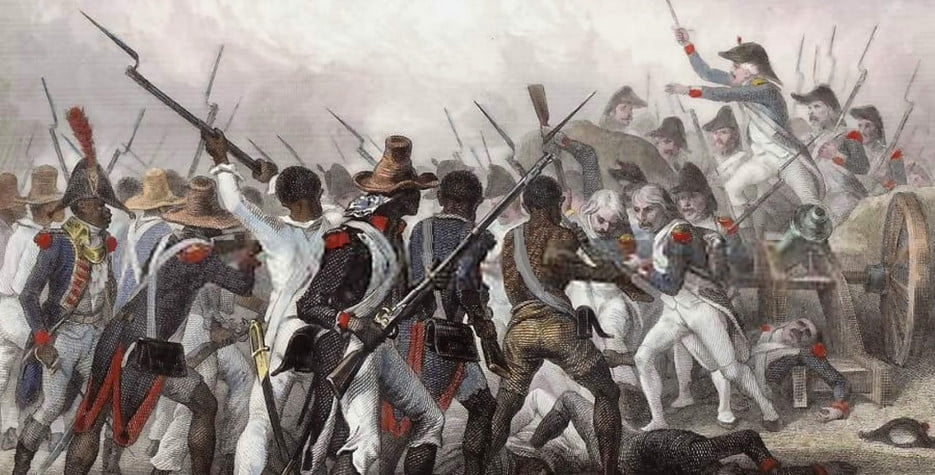
BLACK JAKOBINERS : 18th November 1803 the liberated slaves won the last battle of the Haitian Revolution against Napoleon's troops (Photo). More about this revolution, the "Black Spartacus" and the history of slavery starting Monday in the new episode of the #RosaluxHistory podcast.
